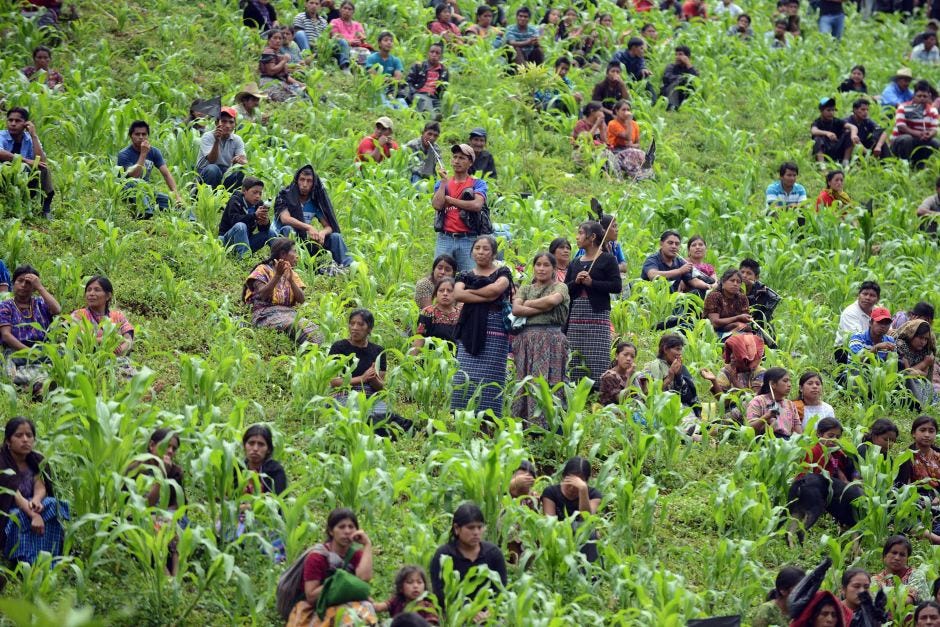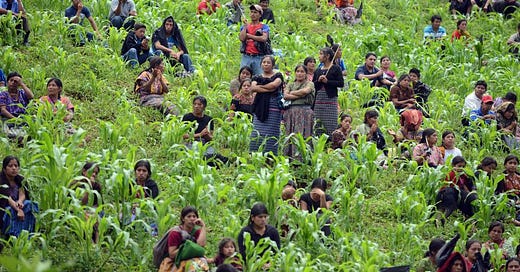Marx or Hayek?

We went to visit our rich friends. Another typical libertarian ground-hog-day experience. You must know the kind. You are asked to offer a libertarian solution to a particular socialist concern. You give an answer, they listen to it nodding their heads then the next time you meet them, they ask the same question and offer the same arguments with the same objections as if the previous conversation had never taken place. My friends are what I would call ‘medium rich’ somewhere between the top 1% and the top 0.1%. Like many people who can afford to be, they are generous. Their cause is to help people in extreme poverty. They have a foundation to support poor children to get education in places such as rural India and Guatemala. They offer individual scholarships, monitor the progress of the children enrolled in their schools, they often visit ready to get their hands dirty helping. They keep a close watch on it making sure that no money, goods or effort go to waste. They are wonderful people doing the right thing the right way. Which, unfortunately, does not mean that they can be free of their socialist impulses. They, especially she, is bemoaning the conditions of the people, the politics, the country and confronted me yet again with the question: what would I, what would Libertarians do for these poor people. My first reaction was ‘NOT A GODDAMN THING!’ It is none of my business. It’s none of hers. Freedom cannot be given to people; it cannot be imposed on them. It is something they have to want, something they have to strive for, something that they have to earn. There is something fundamentally insulting in the condescending arrogance of the assumption that we, the outsiders could possibly have the answers. But the question of my friend wasn’t really about Guatemala or places like it, it was about my beliefs. She still does not get the libertarian idea, and considers the misery in these places as some sort of ‘proof’ that freedom is not and cannot be the answer. She is a socialist at heart picturing some sort of revolution that will set things right. Something or someone that will give the freedom, justice and the dignity to the people. I am not entirely sarcastic, just a tiny bit. The essence of socialist beliefs is that these things can be given, that society can get them ‘wholesale’; that acquiring them is a collective endeavour. How to get any of it is something the Guatemalans have to figure out for themselves. Which is not to say that we cannot have suggestions, but whatever we suggest will be obviously influenced by our own ideas about politics and the economy. Milton Friedman said that:
“Only a crisis - actual or perceived - produces real change. When that crisis occurs, the actions that are taken depend on the ideas that are lying around.”
The real question is not what we can do for the people of Guatemala, but this: from the ideas lying around, which one will they pick: freedom or socialism?
What we can know
I have never been to Guatemala. All I know about it is what anybody can. We can learn about their history, look up economic indicators and find out how they are handling their problems today. There are hundreds of studies, reports, articles and documentaries around. Guatemala had a rough history, especially in the 20th century. During the cold-war, like many other Central-American country, it was a pawn of the geopolitical power games. The governments of Cuba, Nicaragua and El Salvador were supported by the Soviet Union while their internal oppositions were financed by the US. In Panama, Honduras and Guatemala it was the other way around. Serious atrocities were committed, mostly by government forces. It is bad and it is sad that it happened but there isn’t much we can do about it now. Some of the people responsible for the worst of it have been and are being brought to justice to this day. The end of the conflict started when the USSR ended and the communist guerillas lost their financial support. A peace accord was reached in 1996. Since that time the country is moving in the right direction. They have healthy economic growth, low unemployment, very low debt and deficit. The government is only responsible for 10% of the GDP. In all of these indicators, they are doing better than either Canada or the US and their growth rate shows it. Where they are not doing well are inequality, corruption and violent crimes. Their Gini coefficient (measure of inequality) is 52.4 (compared to Canada’s 33.7). Their murder rate is the 8th worst in the world at 34.6 (compared to Canada’s 1.4). Their corruption perception index ranks them 123/168 (compared to Canada’s 9/168). For a casual observer, the good things are very difficult and the bad things are very easy to see. The bad things above are the things that prompt the well intentioned visitors to ask:
What can be done?
Before we can answer that question, we must ask by who? Us, the well intentioned visitors of the western/developed world; the Guatemalan people or the Guatemalan government? Let’s start in reverse. The government can do the most by staying small, by restricting itself to the core functions of a government: providing law and order and maybe basic infrastructure. Not dealing with the crime is criminal. The present government got into power with the promise of cracking down on corruption. Let’s hope they’ll do it. Corruption and crime are the greatest impediments to progress. Once the crime rate is reduced, the economy will pick up even more. The government can also help this by making the country not only safer but more friendly for foreign investment by further improving its already quite decent ranking (#33 with a score of 7.45) on the economic freedom index. Lower corporate taxes, lessen regulations. Many commenters noted that poor infrastructure is a serious impediment to progress. Building roads would help the poor the most. It may not be very nice to say that, but the people bear the most responsibility for their own misery. Freedom is not for everybody, it has some serious prerequisites, such as self reliance, respect for other members of society and their property. Some call it the three ‘R’s: Reputation, Reciprocity, Retribution. What the crime rates indicate is that the people of Guatemala are seriously lacking in this respect. Poverty does not cause crime; it is the other way around. Self esteem and dignity cannot be given, it is the reward for being a decent, upstanding member of society. The decent people have to learn how to shun and shame the bad ones and to instill the highest moral expectations in their children. The police and the government can only catch and punish criminals. Society must do a lot more preventing it. Corruption, crime and alcoholism are not acts of nature. People are not victimised by them, but visiting them on themselves. People can also do a lot for their own economic well-being. Instead of protesting industrial development as the people in the picture above do, they should welcome it. The greatest asset poor people have is their labor. They should welcome anybody who would bring work to them. Guatemala is already active in the world of microfinance. It should do more. Creating cooperatives and associations as those are the strongest bricks of a free society. Not expecting ANYTHING from the government beyond the protection of freedom and property rights. Maybe decent roads. What can outsiders do? The problem with the bleeding-heart do-gooders is that they come from places where “the ideas that are laying around” are not ideas of freedom. The most important thing they need to understand is that wealth needs to be created before it can be redistributed. Socialism is a bad idea everywhere, but it is especially so in poor places. The answers are economic freedom, self-reliance, small enterprises, social cooperation, a strong civil society. Our friends are doing exactly what needs to be done. Helping individual kids based on merit and showing a good example of charity. I am not even sure that they understand that it is the second part that is the most important. Showing with an example that in rich places, people who can, help those who need it, and that to work well, help needs some sort of reciprocity: effort at best, gratitude at the least. The results are slow to show, but it is the only thing that works. Robin Hood socialism doesn’t. In the end, the fate of Guatemala depends on this question alone: which direction are they going to take: freedom or slavery? Free markets with individual responsibility or socialism? Marx or Hayek? The best we, the outsiders, can do for them is not giving them the wrong ideas.
Links
Economy of Guatemala - Wikipedia, the free encyclopedia Guatemala Facts, information, pictures - Encyclopedia.com articles about Guatemala Poverty Analysis - Guatemala- An Assessment of Poverty List of countries by intentional homicide rate - Wikipedia, the free encyclopedia https---www.unodc.org-documents-data-and-analysis-Crime-statistics-International_Statistics_on_Crime_and_Justice.pdf Guatemala 2015 Crime and Safety Report The World Factbook List of countries by intentional homicide rate - Wikipedia, the free encyclopedia List of countries by income equality - Wikipedia, the free encyclopedia Corruption Perceptions Index 2015 - Transparency International Guatemala Economy - GDP, Inflation, CPI and Interest Rate Some YouTube documentaries: This is Guatemala - YouTube Hecho a Mano- Three Stories From Guatemala (Documentary 2002) - YouTube An American Genocide - Guatemala - YouTube Guatemala Documentary - YouTube



